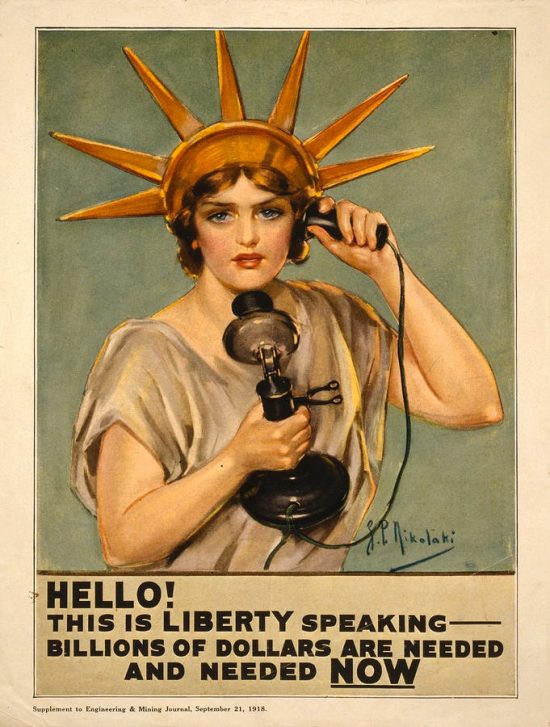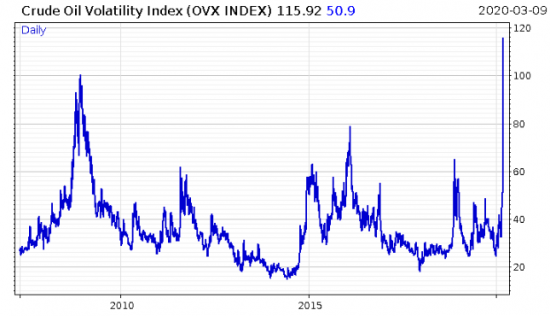“This is the best goddam drill the army’s ever put on!”
– US Navy sailor at Pearl Harbor after the explosions began
The bull market is dead. Long live the bull market. That’s the FTSE 100 well into the bear’s lair after the worst day for the index since Lehman Brothers went broke.
The US indices are just a whisker off bear status at the time of writing – and that was only after they pulled the circuit breakers on the stock exchange to stop any trades taking place.
Hell, the only thing I can see that got a decent bid yesterday was coffee futures – further bad news for Starbucks ($SBUX) which got whacked 7% yesterday…
But have no fear – the Feds are coming to the rescue. Indeed, the Plunge Protection Team (PPT) has been called. At 7pm tonight, Donald Trump, himself only a handshake away from contracting WuFlu, will be meeting the nation’s biggest bankers to discuss how to goose the markets up, with the classic entreaty:
 Source: WikiCommons.
Source: WikiCommons.
Attribution: Nikolaki, Z. P., artist/public domain
Treasury Secretary Steven Mnuchin is now looking to rustle up some of that sweet fiscal stimulus to inject into the American consumer, the engine of the world’s largest economy. Tax cuts and infrastructure spending are on the cards – what’s not revealed is that it will likely be the Federal Reserve that ultimately will print the money to pay for it…
But will his efforts surpass his proudest achievement thus far in his life, the production of The Lego Movie?
Or somewhat more importantly, will any of these efforts be effective in ridding the market of bears and luring the bulls back in..?
Bull bait
Our publisher Nick O’Connor certainly knows when to throw an event.
The End of the Bull Market has been in the works for a while now, after Nick became sceptical that things would stay as frothy as they were at the end of last year.
When large economic expansions end, they don’t end when everybody expects, or even how they expect. There can still be a melt-up in asset prices on the back of falling economic fundamentals, which catches the crowd off guard.
These “last hurrahs” can vastly enrich investors – provided they know when to get into cash. For when the end really does arrive, it arrives suddenly, and brutally. That’s why you need to pay attention to the right indicators –
If you haven’t signed up yet for his presentation on avoiding getting mauled by a bear at the end of a stockmarket cycle, He’ll show you some of the critical levels some of the world’s top stocks need to hit before they really go down the swanny… and when to hold on to get that last bit of juice that’s left in the tank.
With Italy on national lockdown, and supposedly suspending all mortgage payments… Trump bringing in the PPT… the floor of the oil market collapsing… gold hitting all-time highs…
We’ve been asking ourselves the same question:
Is this The End?
If it is, we ain’t seen nothing yet – You can’t just give a trillion-pound debt cycle a Covid-19 antidote and just expect everything to be dandy…
But despite all the chaos, I think there’s some good news. The problem is, it’s disguised as very bad news.
Mohammed bin Sellin’
This is what happens when Mohammed bin Salman and Vladimir Putin decide to turn on the oil taps and then go for a drive:
 Volatility in the oil space has reached unprecedented levels
Volatility in the oil space has reached unprecedented levels
We highlighted the oil collapse yesterday as a potential black swan risk to markets, as the massively indebted fracking companies are at risk of default and wiping out their debtors, which include some regional banks.
Indeed, my colleague James Allen predicted a while back that the Fed will be forced to buy the debt of these companies to keep them from going bust, printing money to keep the US’s disruptive energy power alive.
This risk is definitely there, and the mainstream press has been very quick to claim that the sell-off in oil is in fact the reason for the global stockmarket having such a hard time.
But while taking a quick break from the office to grab a can of Monster Energy yesterday (if you’re reading this $MNST, chuck me a sponsorship will ya?), I came to the conclusion that Saudi Arabia might actually have just saved the world.
We’ll go into the fallout from the decision of Saudi Arabia to drown the world in oil, and what motivated it to do it in the first place, tomorrow. But first, who loses from lower energy prices, other than the energy sector? Why would stocks sell off on the news that the most basic input of any economic activity – energy – is getting cheaper anyway?
I don’t buy that low oil is what caused anything other than energy stocks and debt to sell off. In fact, I think low oil is actually a terrific boon to the global economy right now.
The Fed tried to accommodate the arrival of coronavirus by cutting interest rates. This is pretty absurd to say the least, though hardly a surprise if you’ve been watching the best-laid schemes of central bankers going “aft agley” in recent years. Indeed, as Grant Williams commented recently:
It shouldn’t come as a surprise to anybody that the hubris building amongst the central bank community since Alan Greenspan became The Maestro has reached the point where Jay Powell now presents himself as the antidote to COVID-19.
Powell’s emergency interest rate cut of 0.5% did nothing to reassure markets – quite the opposite. In fact, the futures market is now already pricing in a further 0.75% interest rate cut from the Fed just next week.
But brutalising savers to aid borrowers is not going to do much to grease the wheels of economic activity, only keep heavily indebted entities alive during an economic slowdown.
What will stimulate economic activity is low energy prices. This is inherently stimulative, as we need energy to do anything. Countries like India that import vast quantities of oil are effectively receiving an economic tailwind from Saudi Arabia and Russia.
Mess around with interest rates all you like, cheaper energy will always be beneficial to economic growth, provided your economy is not built on producing energy.
This subsidy from the Saudis is “real” quantitative easing, which is transferring some of the risk of coronavirus causing an economic slowdown, to the risk of energy producers going bust.
It’s unlikely you’ll hear them get any thanks for this – and as we’ll explore tomorrow, they’re not doing this altruistically – but I think an oil price war is actually exactly what the world needs right now. Such a war… may actually mean peace.
But is it enough? Will Mohammed bin Salman’s oil selling save the day?
Only time will tell. In the meantime, you need to be prepared –
All the best,

Boaz Shoshan
Editor, Capital & Conflict
Category: Market updates

